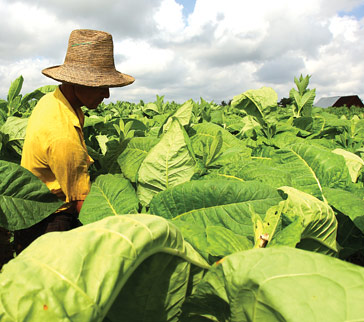Farmers Union of Malawi (FUM) says there is need to do a ‘microscopic analysis’ of the 2012/13 agriculture budget despite surpassing the 10 percent of gross domestic product (GDP) in line with the 2002 Maputo Declaration.
“We need to see the reality of the budget by beginning to isolate some activities that should go to Safety Net programmes and also consider the devaluation to see the real value of the budget and assess its ability to make an impact on productivity before concluding that the budget is better,” said FUM president Felix Jumbe this week in an e-mailed response to a questionnaire.
He, however, commended government’s move to double resources to the agriculture sector, but suggested that the funds should go into the core functions of the ministry to promote productivity.
“It would have been much better if the funds were to go into the core functions of the ministry to champion productivity that would result in high volumes of production and quality agriculture commodities such as milk, honey, chickens, soya, tea, coffee, wheat, ‘pegion peas, beef and rice among others, in such volumes that would make our exports on these surpass the import bill,” said Jumbe.
The agriculture sector has been allocated K65 billion (about $260m) in the 2012/13 fiscal year, of which K14 billion (about $56m) is for development projects such as cotton production and ginning and smallholder agriculture.
Out of this, K40.7 billion (about $162m) goes into the Farm Input Subsidy Programme (Fisp) for procurement of 150 000 metric tonnes of fertiliser, K7.6 billion (about $30.4m) is for procurement of improved maize seed to be distributed as part of the Fisp whereas K2.4 billion (about $9.6m) will go to the Presidential Initiative on Livestock Development and the promotion of special crops for the export market.
As regards the K2.4 billion Presidential Initiative on Livestock Development and Promotion of Special Crops for the export market, Jumbe said the country needs to broaden its export base and also intensify the production of traditional export crops.
In the 2011/2012 budget, government made deliberate efforts to promote cotton production by allocating MK1.6 billion (about $6.4m) whose output this year rose to 244 000 tonnes, representing a 365 percent increase from last year’s 52 000 tonnes.
“The tonnage realised will this year begin to contribute to generation of foreign currency for Malawi and there is need to ensure that we sustain this production into the future by having the right pricing mechanism and marketing system, which is a challenge at the moment,” he said.
Malawi needs to develop a sustainable and efficient production system for crops so that the country begins to export at competitive prices, said Jumbe.
He said the Presidential Initiative on Livestock Development and the Promotion of Special Crops is a catalyst for diversification of the country’s export base and will result in an increased volume of production.

